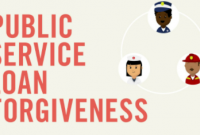Federal student loans, also recognized as government loans, allow the students and parents or guardians to borrow money for college directly from the federal government. By the way, could your federal student loans be forgiven if you work in public service? Well, find out that answer by reading the text below. Here, we will also share other information related to Federal Student Loans.
Could Your Federal Student Loans be Forgiven if You Work in Public Service?
When you have Federal Student Loans, could your federal student loans be forgiven if you work in public service? The simple answer is yes. Through the Public Service Loan Forgiveness Program, the government is going to forgive the remaining balance on your student loans if you have already worked in a public service job for at least 10 years.
Types of Federal Student Loans
Apparently, there are three types of federal student loans:
- Direct Subsidized Loans
- Direct Unsubsidized Loans
- Direct PLUS Loans, of which there are two kinds: Grad PLUS Loans for graduate and professional students, as well as loans which can be issued to a student’s parents, also recognized as Parent PLUS Loans.
Those loans are available via the Federal Direct Loan Program. Because federal loans offer different benefits than private student loans, you should explore them first. Let us learn more about the three kinds of federal student loans:
- Direct Subsidized Loans
Direct Subsidized loans are for the students with demonstrated financial need, as determined by the federal regulations. There is no interest charged while an undergraduate student is in school at least half-time, during deferment (a period when loan payments are postponed temporarily), or during grace (the period, usually 6 months after you graduate or leave school, before you begin to create principal and interest payments). - Direct Unsubsidized Loans
Direct Unsubsidized Loans are federal student loans which are not based on financial need. Your school will determine the amount you are able to borrow based on the cost of attendance and other financial aid you receive. Interest is charged during all periods and are going to be capitalized (when unpaid interest is added to a student loan’s principal amount), even when you are in school, during grace, and deferment periods. This will increase your total federal loan cost. - Direct PLUS Loans
Direct PLUS loans are unsubsidized credit-based federal loans for the parents of dependent students and graduate/professional students. PLUS loans will be able to help pay for education expenses up to the cost of attendance, after your other financial aid is finished. Interest is charged during all periods and also will be capitalized. This will increase your total federal loan cost.
Federal Student Loan Benefits
Here are some Federal Student Loan benefits:
- You have flexibility.
Although any student loan; federal or private, is a legal agreement and must be paid back with interest, federal student loans usually offer more flexible choices than private student loans. For instance, with federal student loans, the borrower will be able to change their repayment options even after the loan has been disbursed (sent to your school). - You are able to make payments based on your salary.
Several federal student loans allow for income-driven (or income-based) repayment plans that cap the payments based on the borrower’s income and family size. - You do not need a strong credit history to obtain federal student loans.
Unlike with the private student loans, most federal student loans do not need the borrower to have a strong credit history. This can be really helpful for recent high school graduates who plan on attending college however have not had enough time to build up credit of their own. - You do not need a cosigner.
With most federal student loans, other than Direct PLUS Loans, the borrower’s credit is not considered, thus it is not necessary to apply with a cosigner.
Apply for Federal Student Loans for College
It is free to apply for a federal student loan. All you have to do is complete the Free Application for Federal Student Aid (FAFSA). Besides federal student loans, the Federal Student Aid (FAFSA) also determines your eligibility for other federal student aid like the grants and work-study. You have to submit the Federal Student Aid (FAFSA) every year you are enrolled in college to receive federal student aid.
The easiest and fastest method to file the Federal Student Aid (FAFSA) is online. Your application is going to be processed within 3-5 days. Also, you are able to mail in a paper application, however processing it will take approximately 7-10 days. Remember that submitting the Federal Student Aid (FAFSA) is totally free.
What Happens After You Submit the Federal Student Aid (FAFSA)?
After you submit the Federal Student Aid (FAFSA), the government will send you a Student Aid Report (SAR) that gives you basic information about your eligibility for federal student aid. The colleges you included on your Federal Student Aid (FAFSA) will have access to this information, and they are going to use it to specify the amount of federal grants and loans you may qualify for.
The colleges you are accepted to will deliver you a financial aid offer detailing the financial aid you are eligible to receive, including federal student loans, the grants, and work-study. The amount of federal aid you accept from each school will vary, just as the cost of attending each school varies.
Federal Student Loans For Graduate Students
The Graduate students may qualify for aid from the federal student aid programs below:
- The William D. Ford Federal Direct Loan Program
- Teacher Education Assistance for College and Higher Education Grant
Availability of Federal Student Loans
To get know if the school you are interested in participates in the federal student aid programs, there is a college search tool that hosted by the National Center for Education Statistics. Therefore, you will be able to use it.






